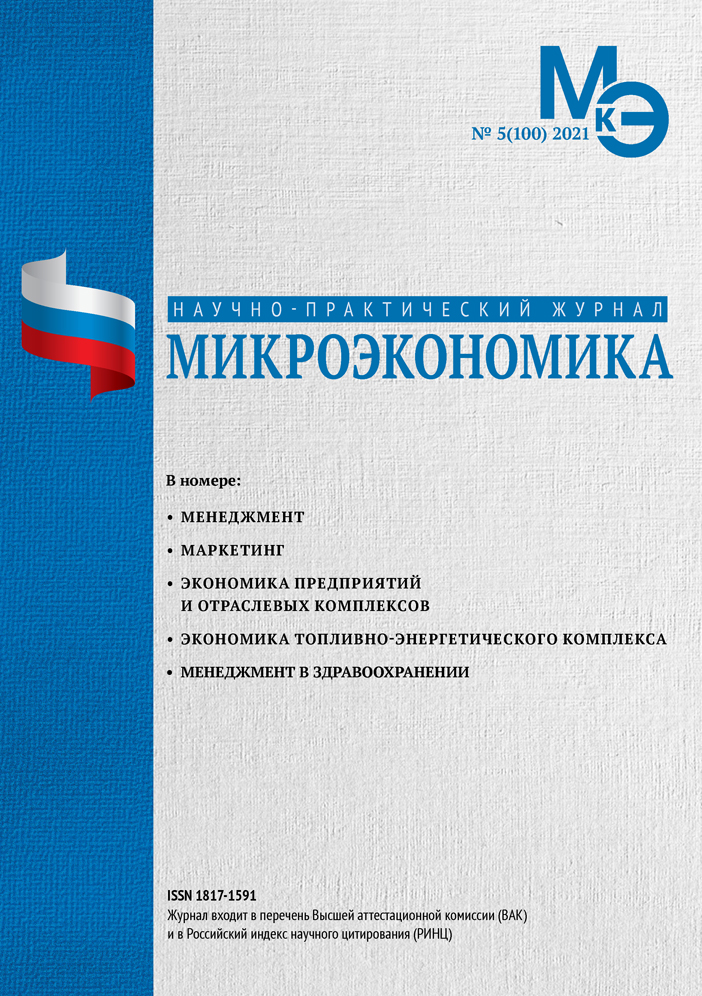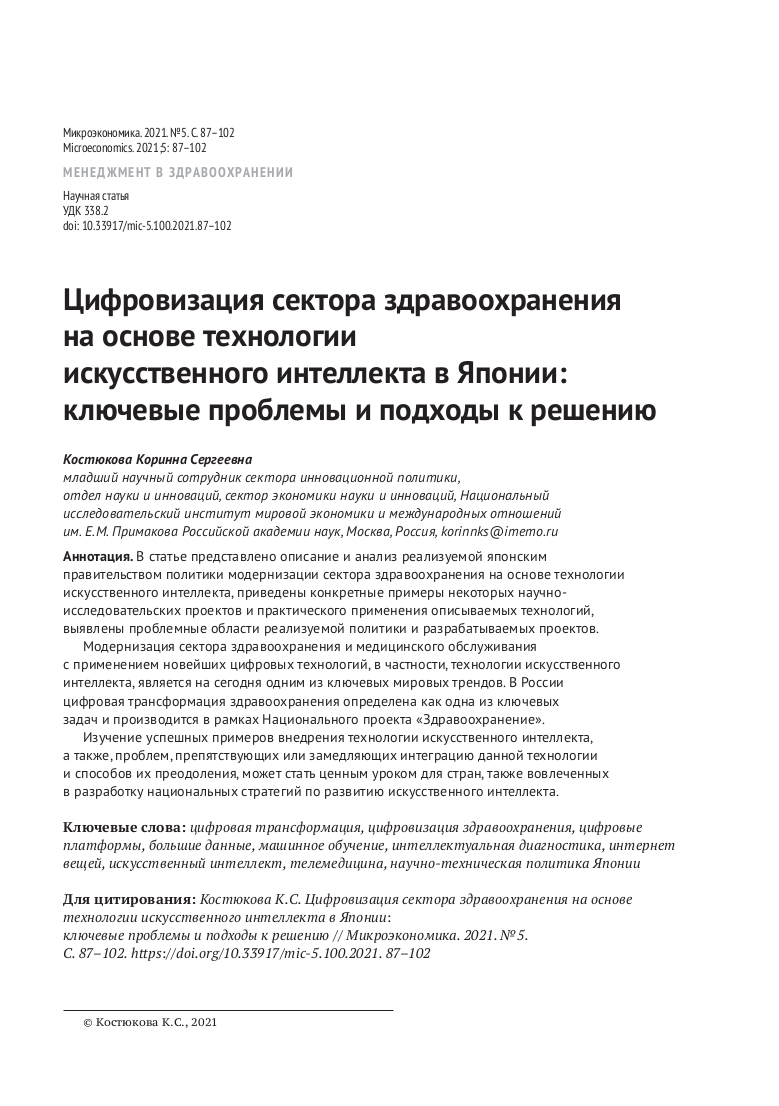Digitalization of the healthcare sector in Japan based on artificial intelligence technology: key problems and solutions
DOI: 10.33917/mic-5.100.2021.87-102
The article deals with a description and analysis of the policy of modernization of the healthcare sector implemented by the Japanese government on the basis of artificial technology, provides particular examples of some research projects and cases of practical application of the described technologies, identifies problem areas of the policy being implemented and projects being developed.
Modernization of the healthcare sector and medical services based on using of the latest digital technologies, in particular, artificial intelligence technology, is one of the key current global trends. In Russia, the digital transformation of healthcare is defined as one of the key tasks and is carried out within the framework of the National Project «Healthcare».
The study of successful examples of the introduction of artificial intelligence technology, as well as problems that hinder or slow down the integration of this technology and ways to overcome them, can be a valuable lesson for countries also involved in the development of national strategies for the development of artificial intelligence.
References:
1. Meldo A.A., Urkin L.V., Trofimova T.N. Artificial intelligence in medicine: current state and main directions of development of the intellectual diagnostics. Diagnostic radiology and radiotherapy. 2020;11(1):9-17. (In Russ.). URL: https://doi.org/10.22328/2079-5343-2020-11-1-9-17
2. Moiseenko V.M., Meldo A.A., Urkin L.V., Prokhorov I.U., Ryabinin M.A., Bogdanov A.A. Automated detection system for lungnmasses as a stage of artificial intelligence development in the diagnostics of lung cancer. Diagnostic radiology and radiotherapy. 2018;3:62-68. (In Russ.). URL: https://doi.org/10.22328/2079-5343-2018-9-3-62-68
3. Nikolenko S., Kadurin A., Arkhangelskaya E. Deep learning. StP.: Piter, 2018. 480 p. (In Russ.).
4. Adam Bohr, Kaveh Memarzadeh. Artificial Intelligence in Healthcare, Academic Press, 2020. URL: https://doi.org/10.1016/B978-0-12-818438-7.00014-9
5. Anthony C. Chang, Intelligence-Based Medicine, Academic Press, 2020. URL: https://doi.org/10.1016/B978-0-12-823337-5.00013-5.
6. Aoe J., Fukuma R., Yanagisawa T., Harada T., Tanaka M., Kobayashi M., et al. Automatic diagnosis of neurological diseases using MEG signals with a deep neural network. Sci Rep. Nature Publishing Group; 2019;9:1–9. URL: https://www.nature.com/articles/s41598-019-41500-x
7. Arai S. China’s AI ambitions revealed by most cited research papers, November 2017. URL: https://www.ft.com/content/daf53474-c21c-11e7-a1d2-6786f39ef675.
8. Gagné J.F. Global AI Talent Report 2019. URL: https://jfgagne.ai/talent-2019/
9. Holzinger A., Biemann C., Pattichis C.S., Kell D.B. What do we need to build explainable AI systems for the medical domain? // arXiv: 1712.09923, Dec 2017.
10. Inoue S., Hatakeyama J., Kondo Y., Hifumi T., Sakuramoto H., Kawasaki T., et al. Post-intensive care syndrome: its pathophysiology, prevention, and future directions. Acute Med Surg. 2019;6(3):233–46.
11. Kaynak O. The golden age of Artificial Intelligence. Discov Artif Intell, 1 (2021). URL: https://doi.org/10.1007/s44163-021-00009-x
12. Kim J., Chae M., Chang H.J., et al. Predicting cardiac arrest and respiratory failure using feasible artificial intelligence with simple trajectories of patient data. J Clin Med. 2019:8(1336). URL: https://doi.org/10.3390/jcm8091336
13. Le Gruenwald Sarika Jain Sven Groppe. Leveraging Artificial Intelligence in Global Epidemics
1st Edition, Academic Press, 2021. URL: https://doi.org/10.1016/B978-0-323-89777-8.00016-6
14. Lovejoy C.A., Buch V., Maruthappu M. Artificial intelligence in the intensive care unit. Crit Care. 2019;23(7). URL: https://doi.org/10.1186/s13054-018-2301-9
15. Nogueira R.G., Silva G.S., Lima F.O., Yeh Y-C., Fleming C., Branco D., et al. The FAST-ED App: a smartphone platform for the field triage of patients with stroke. Stroke. 2017;48:1278–1284. URL: http://dx.doi.org/10.1161/STROKEAHA.116.016026.
16. OECD. (2018). Education Policy in Japan: Building Bridges Towards 2030. Paris: OECD Directorate for Education and Skills.
17. OECD. (2020). Treatments and a vaccine for COVID-19: the need for coordinating policies on R&D, manufacturing and access. Paris: OECD.
18. OECD. (2020). Using artificial intelligence to help combat COVID-19. Paris: OECD.
19. SCAIT, 2017. Artificial Intelligence Technology Strategy. Tokyo: Strategic Council for AI Technology.
20. Sato M., Morimoto K., Kajihara S., Tateishi R., Shiina S., Koike K., et al. Machine-learning approach for the development of a novel predictive model for the diagnosis of hepatocellular carcinoma. Sci Rep. 2019; 9:7704. URL: http://dx.doi.org/10.1038/s41598-019-44022-8
21. Strategic Council for AI Technology. Artificial Intelligence Technology Strategy (Report of Strategic Council for AI Technology). 2017. URL: https://www.nedo.go.jp/content/100865202.pdf.
22. Walawalkar D. A fully automated framework for lung tumour detection, segmentation and analysis // arXiv: 1801.01402, Jan 2018.
23. 第IX次 学術推進会議 報告書 . 人工知能(AI)と医療. 2018. URL: https://www.med.or.jp/dl-med/teireikaiken/20180620_3.pdf



